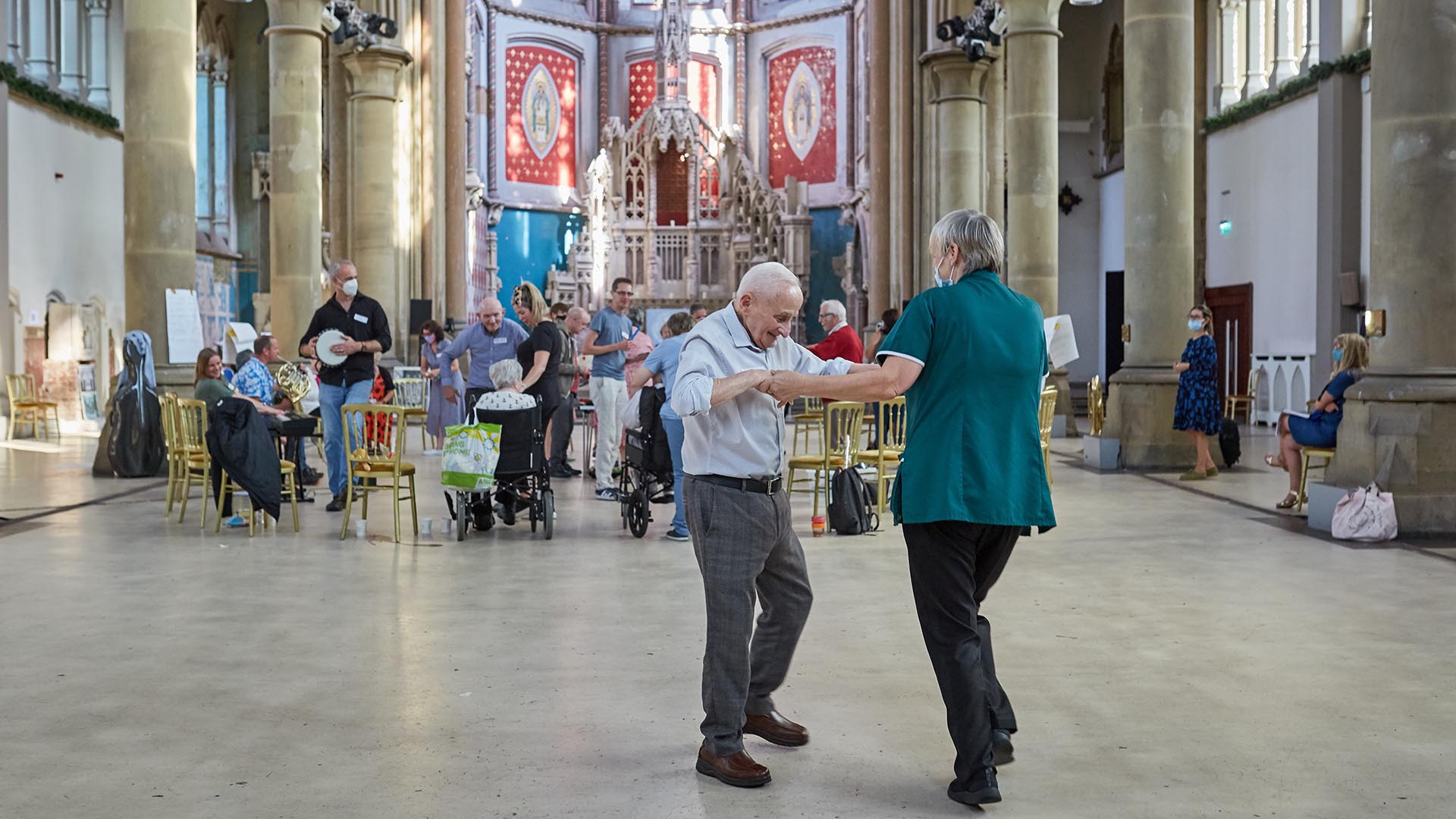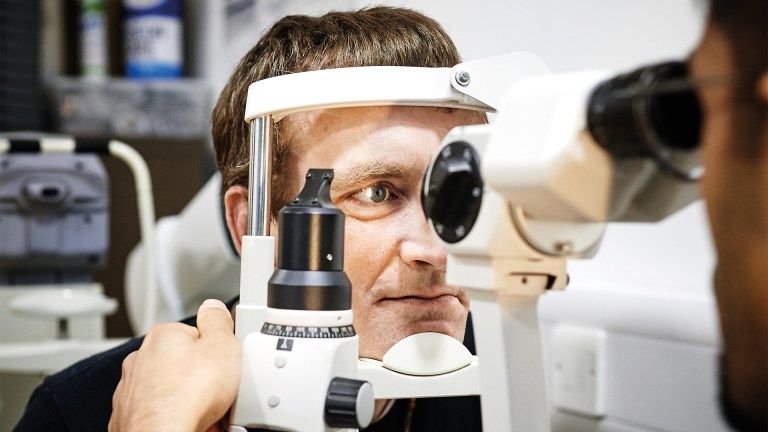Manchester Camerata offers these therapies in care homes, and recently launched a weekly music cafe at the Monastery, along with several other locations across Greater Manchester. For an hour each week, participants can enjoy the benefits free of charge. The musicians lead them in improvisation, encouraging imagination and interaction.
John has attended the sessions with his daughter, Jo, since they began 10 weeks ago.
“I was looking for something to do with my dad,” Jo says. “He is a little bit musical, so when I saw that they run a music café here, I thought I’d try it with him. He absolutely loves it. It gives him a bit of focus – when you’ve got dementia, it can be difficult to focus sometimes, but when he comes here, he’s just lost in it.”
As Jo talks, John chats and laughs with fellow participant Alan. “He loves the social side of it,” Jo says. “He gets to interact with lots of different people. There’s a lady here who apparently gets up on Wednesdays and says, ‘I hope John’s going to be here today.’
“Dementia can make you quite isolated, and my dad doesn’t initiate conversations anymore, but when he comes here, he just comes alive. It’s so good for carers, as well. I’ve loved doing something with him and seeing him enjoy himself and come out of himself.”
Beryl has also attended every session, accompanied by daughters Irenka and Sonia.
Advertising helps fund Big Issue’s mission to end poverty
They had watched 2019 BBC programme Our Dementia Choir with Vicky McClure, in which the actor explored the impact that music could have on people living with dementia. When their mum received her diagnosis, they were keen for her to reap those benefits.
The impact on Beryl was immediately clear to them. “I was surprised that when they played certain tunes, straight away, she knew what the song was and would sing along,” Sonia says.
“Recently, since we’ve been coming, she’s been getting the rhythm of the music, as well,” Irenka adds. “The staff pay a lot of attention to them – they really get them involved.”
“Camerata has become a family to us,” Sonia agrees. “I leave with my cheeks aching. It just instils cheerfulness.” Beryl also looks forward to the sessions. “She might not remember what she’s coming for, but she knows that she enjoys it. You can have a really bad night or a bad day, and then you come here, and it just lifts.”
The sessions also have a clear impact on carers’ wellbeing. “They always make us feel welcome,” Irenka says. “They give you that lift and that support and say, ‘You’re doing a fantastic job,’ and you don’t get that often.”
She and Sonia say that they wish the sessions lasted longer than an hour – but also that they bleed into their home life. Beryl, they say, is notably more musical in her everyday life, singing and playing shaky eggs, which she enjoys using at the music cafe.
Advertising helps fund Big Issue’s mission to end poverty
During the session, it is clear what close attention the Camerata staff pay to participants’ particular interests. Alan, who used to belong to a marching band, is a proficient drummer, and the musicians provide him with a range of drumsticks, from mallets to brushes, with which he plays in perfect time with the music.
They also take song requests, including a moving rendition of Amazing Grace, to which several participants sing along, note for note and word for word.
Freelance flautist Áine Molines circulates among the group, playing to the participants and encouraging them in collaboration. “I love this kind of work,” she says. “It’s such a privilege as a musician to be able to come here and make music in this setting.
“It enhances my work hugely. I just see music in a fresh way – rather than sitting down with a piece of music in front of me or teaching a student the notes on a page, here, the music is organic, and being able to connect to somebody with music can have such a huge impact.”
As Christmas approaches, television scheduling will be increasingly dominated by musical performances from churches up and down the country, but few will mean as much as the music café does to those who come together to play each week.
For more information, visit Manchester Camerata’s website.
Advertising helps fund Big Issue’s mission to end poverty
Do you have a story to tell or opinions to share about this? We want to hear from you. Get in touch and tell us more.
This article is taken from The Big Issue magazine, which exists to give homeless, long-term unemployed and marginalised people the opportunity to earn an income. To support our work buy a copy!
If you cannot reach your local vendor, you can still click HERE to subscribe to The Big Issue or give a gift subscription. You can also purchase one-off issues from The Big Issue Shop or The Big Issue app, available now from the App Store or Google Play










